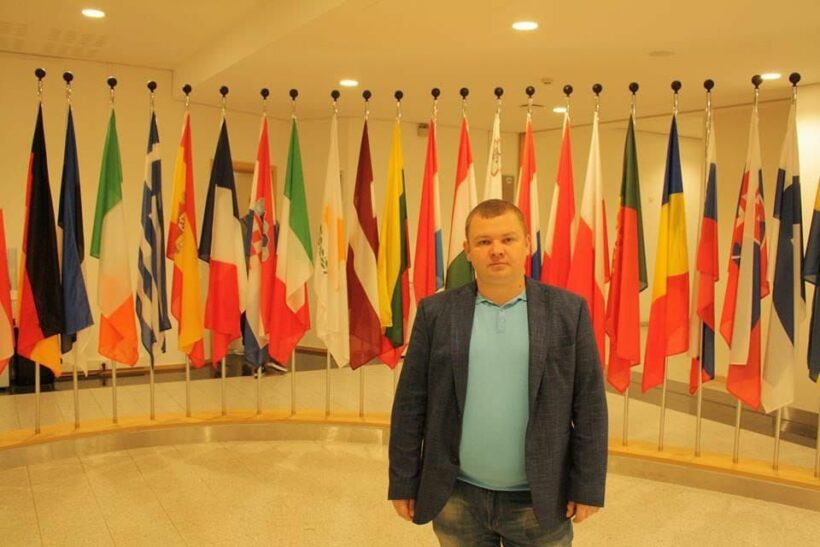The wave of resignations and dismissals of senior Ukrainian officials is just the latest jolt in a broader political earthquake that is rocking Kiev. It began with the resignation of Oleksij Arestovych, one of President Volodymir Zelensky’s most prominent advisers, who was swept up in controversy after questioning the cause of the Dnipro disaster.
The day after his resignation letter, Jan. 18, a helicopter crashed into a kindergarten in Brovary; on board were the interior minister, his deputy and the secretary of state, all three of whom died. In the investigation, entrusted to the Ukrainian Security Services (SBU), sabotage is not ruled out.
Meanwhile, a skeleton is pulled out of the SBU’s closet. The head of military intelligence, (GUR), Kirill Budanov, in an interview with the Wall Street Journal, blames the security services for the murder of Denis Kireev, one of his closest trusted men, whom he had tasked to sit at the negotiating table in Gomel. To no avail, Zelensky’s adviser Mykhailo Podolyak had tried to downplay it, speaking of a “lack of coordination” between SBU and GUR. In a later interview with Radio Svoboda, Budanov said his official had been eliminated by SBU agents in order to scuttle the negotiating process. A few hours later came the resignation of Kyrilo Timoshenko, deputy head of the Presidential Office, which came after Zelensky’s announcement about “personnel decisions,” followed by those of Ukrainian Deputy Defense Minister Vyacheslav Shapovalov, Deputy Prosecutor General, Oleksiy Symonenko, and a number of governors of several Kiev-controlled regions, including Kherson and Zaporizhye.
In the face of this rapid and dramatic succession of events, could the power apparatus built around Zelensky implode? Are we in danger of witnessing a night of the long knives?
We asked for comments from a member of the leftist opposition (outlawed by the government), Alexei Albu, Odessa council deputy for the Borotba party, a survivor of the May 2, 2014 massacre and a refugee in Lugansk.
Flurry of resignations and dismissals, what is happening in the Kiev Junta?
The Ukrainian government is not homogeneous. Different political clans have different foreign patrons. Some interact with the semicivil sector, for example, with various foundations, such as the Free Soros Society, USAID, UKAID, IRI, NED, Freedom House, Conrad Adenauer Foundation, etc.
Some interact directly with foreign intelligence agencies, such as the CIA and MI-6. Some represent the interests of European capital.
Resignation from the Ukrainian government may indicate divisions within the imperialist camp: dividing the remaining zones of political influence.
On Jan. 16 parliament launched a petition for Arestovich’s resignation, which came with a Facebook post the next day. What led to this striking dismissal?
Arestovich’s exit may be related to his desire to become Ukraine’s chief negotiator with the Russian side.
He often sends signals to the Kremlin that he is, among the entire Ukrainian political establishment, the most suitable figure. And thus, the most convenient candidate for negotiations.
The contradictions within the Ukrainian elite are intensifying and growing every day.
Therefore, Arestovich wants to disassociate himself from the rabid Russophobes because he thinks about his political future in the postwar reality. In this reality, Ukraine will still have to negotiate with Russia.
What balances have been broken within the power group that governs Ukraine?
Unfortunately, we have no insider information. We can only draw conclusions from the external manifestations of certain processes.
Probably the group that was connected to MI6 is losing ground. And the group associated with the CIA, on the contrary, is getting stronger.
The CIA controls the work of the National Anti-Corruption Bureau of Ukraine, which initiated the arrests of high-ranking officials. This was impossible without permission from above.
We see this in other signs that influenced the arrests of high-ranking officials and businessmen in the Odessa region.
Regarding the Brovary air disaster there were some rumors about an inside job. In light of what is happening do you think this is possible?
We know that Monastyrsky (Minister of the Interior,editor’s note), who was on board, had begun to distance himself from Zelensky. And he began a political rapprochement with Zaluzhny. Moreover, the deputy minister, who oversaw many high-profile criminal cases involving Zelensky group interests, died in the helicopter. This suggests that the helicopter may not have crashed due to a malfunction.
The Kireev murder scandal shows a rift within the intelligence community. Why did this affair come out just now?
The fact that this information has appeared only now may indicate that some political clans want to use it in their internal struggle. This is a further sign of a serious division and imbalance in the system.
Could these events lead to an implosion of the government, or does Zelensky’s power remain firmly in place?
Today all the players playing on the Ukrainian chessboard understand that it is impossible to show the public the real state of affairs. Therefore there is a tacit consent to silence. This is because if people understand that the authorities are not monolithic but instead are weak, they will refuse to fight. This is not advantageous for those who benefit from military conflict. However, as we can see, some political clans have violated this consensus. This could cause a chain reaction and send everything into a tailspin. Therefore, the authorities and those in charge of opposition groups will do everything to keep the system stable.
A few days ago, Victor Medvedchuk launched a proposal for a new political movement, a kind of “peace party” to oppose the “war party,” cashing in on the membership of personalities such as Azarov. Could such a project replace the current government?
No. This option is ruled out. The people of the Donbass and that part of the Ukrainian people who do not support the nationalists and await liberation despise Medvedchuk. An attempt to take leadership positions will lead to conflict with society. I think his time is up. It is time for new, young leaders.






